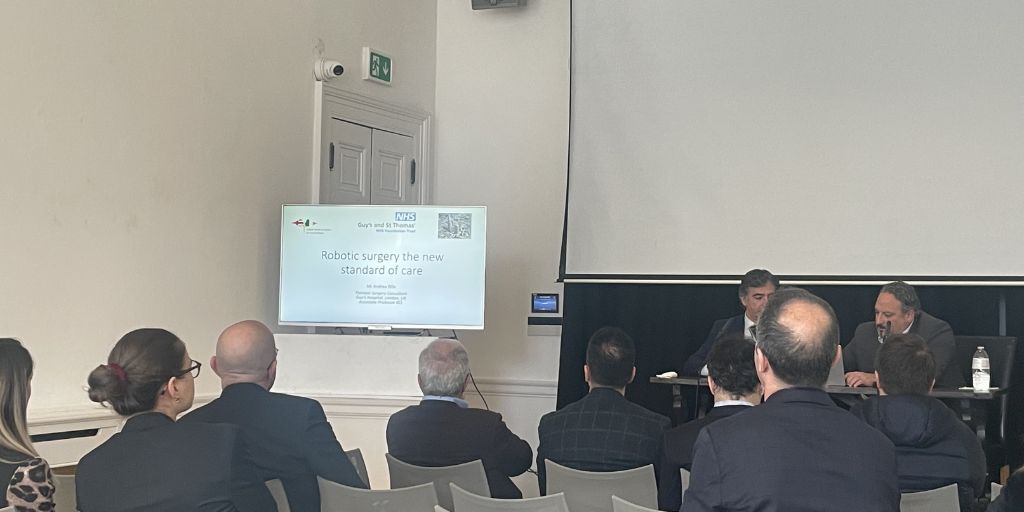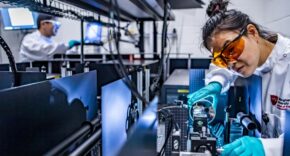
Robotic surgery is becoming the standard of care for specific surgeries in the UK, increasingly valued for its safety and precision. However, it is not yet the “better option”. This is according to Andrea Scala PhD FRCS who spoke at the 2024 the Italian Medical Society of Great Britain Annual General Meeting & Scientific Meeting.
In the UK, robotic surgery has gained significant attention, driven primarily by the market’s demand and increasing incidence of chronic conditions. Advances in artificial intelligence (AI) have played a key role in this shift, moving surgical practices from analogue methods to cutting-edge digital technologies. Despite the growing interest in these innovations, the integration of robotic surgery into the NHS remains a topic of debate.
Today, 14th December 2024, the Italian Medical Society of Great Britain (IMSoGB) held their Annual General Meeting & Scientific Meeting, at Belgrave Square, London. Central to the meeting was the theme of robotic surgery, exploring whether it is the new standard of care and how it can benefit patients, surgeons and the healthcare system.
Andrea Scala PhD FRCS, Consultant Colorectal Surgeon, Royal Surrey NHS Foundation Trust (RSFT) shared his views on the issue. In his current capacity, Scala is well-positioned to discuss robotic surgery. In fact, the RSFT is the only single site NHS Trust in the UK, equipped with four state-of-the-art surgical robots, performing a high volume of procedures every year and achieving some of the best clinical outcomes.
Scala argues that, while robotic surgery is not yet the universal standard of care across all procedures, it is becoming the preferred approach for specific surgeries, particularly in the UK and across Europe.
Between 2016 and 2023, robot-assisted surgeries saw a 524% rise across the NHS and independent healthcare sector. The private sector experienced an even more dramatic growth of 1,370%, although the total number of operations remains much smaller than in the NHS.
The widespread adoption of robotics will continue to grow as technology advances and the financial barriers reduce. It’s still too early to say the robotics will replace laparoscopy, but it’s only a matter of time. – Andrea Scala PhD FRCS, Consultant Colorectal Surgeon, NHS Royal Surrey Foundation Trust (RSFT)
A laparoscopy is a surgical operation that involves a small instrument, laparoscope, inserted directly into the body and stays in a fixed position. This procedure can limit the surgeon’s range of motion. Instead, robotic surgery offers surgeons greater flexibility, allowing for more freedom of movement and better navigation in multiple directions.
Current market-leaders in robotic surgery are the centralised Da Vinci Surgical System and the modular Versius Surgical System. The primary difference between centralised and modular systems is the arm configuration. Where Da Vinci’s arms are attached to a single central control, Versius’ arms are modular and independent. Similar to Versius, Medtronic’s modular Hugo Robotic-Assisted Surgery (RAS) System also incorporates cloud-based surgical video capture and management for better data utilisation.
Joining the discussion is also Andrea Billè , Consultant Thoracic Surgeon at Guy’s and St Thomas’ NHS Foundation Trust and Honorary Senior Clinical Lecturer at King’s College London , who highlights that robotics are now widely accepted as standard of care in many specialties. In particular, they have become integral to thoracic surgery and urology, frequently used for procedures like prostatectomies.
As a surgeon, Billè feels his journey is more relaxed, less demanding and that he is able to do a better job with better precision and control. He also notes the wider benefits for hospitals, including increased surgical efficiency and cost savings in the long-term.
However, financial challenges remain a major burden to increasing uptake of robotics. The latest Da Vinci S model costs around £1.7 million, with additional expenses of approximately £1,000 per patient for disposables and £140,000 a year for maintenance. The capital, maintenance and disposable costs raise questions on the most effective ways to allocate funding, particularly in the NHS – a publicly funded system.
Scala also warns of ongoing online misinformation that may distort the public’s understanding of robotic surgery. Many media outlets, he says, overly praise robotic surgery, despite the very few trials conducted to date.
If you do a quick search on Google for the benefits of robotic surgery, you’ll find claims of less pain and quick recovery. This is not entirely true and there is no confirmed evidence for this yet. – Andrea Scala PhD FRCS, Consultant Colorectal Surgeon, NHS Royal Surrey Foundation Trust (RSFT)
Another challenge involves training. While studies show that robotic surgery training is faster and more intuitive, Billè points out the difficulty in delivering it due to workforce shortages.
Not every hospital has staff available to train. So even if robotics are established, for example in urology, proper training may only be accessible through a fellowship to feel prepared. – Andrea Billè , Consultant Thoracic Surgeon at Guy’s and St Thomas’ NHS Foundation Trust and Honorary Senior Clinical Lecturer at King’s College London
One delegate adds: It’s daunting to train someone because you’re giving them full control. It’s like teaching someone to drive while sitting in the backseat. The consultant needs to be confident and experienced enough to effectively teach, especially in thoracic surgery.
In conclusion, Scala states that while robotic surgery is safer, it is not the better option yet as the existing evidence remains immature, unreliable, and subject to significant bias.
Is robotics surgery better? This technology is amazing and exciting to use, and it brings unlimited development opportunities and the possibility to have more procedures that are minimally invasive. But is it the new standard of care? Not yet, but it will be. – Andrea Scala PhD FRCS, Consultant Colorectal Surgeon, NHS Royal Surrey Foundation Trust (RSFT)












